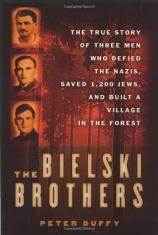Excerpt
Excerpt
The Bielski Brothers: The True Story of Three Men Who Defied the Nazis, Saved 1,200 Jews, and Built a Village in the Forest

Chapter One
From the Tsar To the Führer
In the later years of the 1800s, Elisheva and Zusya Bielski, the grandparents of Tuvia, Asael, and Zus, settled on a plot of farmland in the tiny village of Stankevich in the Belorussian region of tsarist Russia. It was less a village than a collection of a dozen or so wooden homes on the crest of a hill in one of the poorest, most backward corners of Europe. The Bielski home stood separate from the main section of the community, positioned down the slope and on the other side of a small lake fed by a river. And outsiders they were: The Bielskis were the only Jews in town.
The family's property, leased to them by a hard-luck Polish nobleman with a fondness for drinking and gambling, had a water-powered mill and two stables. Soon after arriving in the village in a horse-drawn cart, Zusya and his youngest son, David, started a business turning grains into flours and cereals.
Elisheva and Zusya's other children were married and living in cities, as were most of the Jews residing within the pale of settlement, the huge swath of territory from the Baltic to the Black Sea, where the tsar had ordered all Jews to live. They were subject to a startling number of discriminatory and ever-changing decrees within this large ghetto, forced to pay all manner of onerous taxes, prevented from speaking their native Yiddish language in public, and forbidden from serving in even minor civil-service posts. Tsarist restrictions also made it hard for Jews to live in rural areas, but Elisheva and Zusya were long accustomed to working the land away from population centers.
Not long after the family arrived in Stankevich, the tsar issued another string of anti-Jewish decrees, including one that made it illegal for Jews to buy, sell, manage, or lease rural property. The aging couple was greatly distressed by the order, worried that they would soon be expelled from their home.
But with the resilience that was necessary for a Jew to survive under the tsar, David came up with a way to keep the family in Stankevich. He negotiated a deal with one of the neighbors, a Polish man named Kushel, transferring the property's deed into the gentile's name. The man agreed that his involvement in Bielski affairs would remain in name only, and the arrangement enabled the Bielski family to stay in business. But the stress of the situation added to the miseries of Elisheva, who was suffering from a succession of ailments. David arranged for his mother to see several doctors, but to no avail. She died in a hospital in Vilna, the Lithuanian capital to the north.
By the turn of the century, young David was ready to start a family of his own. He married Beyle Mendelavich, the daughter of a shopkeeper from nearby Petrevich, and he settled into a miller's life, content to follow the path of his aging father, who was himself content to watch the arrival of a new generation. By the time old Zusya died in 1912, Beyle had produced four children -- Velvel, Tuvia, Taibe, and Asael -- and had another on the way. In honor of David's father, the next child, a son, was named Zusya and was known variously as Zusya, Zissel, or Zus.
The children were born into a simple peasant life long before the arrival of electricity or running water in a Belarus region that had for centuries been dominated by its larger neighbors of Russia, Poland, and Lithuania. It was a world of primitive wooden homes topped with roofs of straw, where a peasant's most valued possession was his horse and four-wheeled wooden cart. As the years passed, the family acquired farm animals of every variety, including a few horses, several cows, and some sheep; all the food they ate was produced by their own labor. The parents had their own room, while the children shared the remaining space, sleeping several in the same bed, or, in the summer, tired after a long day of work, on straw in the barn.
The extent of the children's education varied, but most didn't get very far in religious or secular schools. David at times would hire a teacher to come to the house. At other times, a child was sent to live with a relative in Novogrudek, the nearest city with a sizable Jewish population, to be educated in its local schools. The closest synagogue was also located in the city, a fifteen-kilometer trip that took three hours by horse and cart, making it difficult for the family to regularly attend services. Instead, a private home served as their house of worship. On the Sabbath and high holy days, the Bielskis visited the home of the Dziencielski family, who lived two kilometers through a path in the woods in the village of Big Izvah. Like the Bielskis, the Dziencielskis operated a mill and were the only Jews in their town.
David would sometimes lead the congregation in prayer, using a Torah scroll that was kept in the Dziencielski house. He didn't have much in the way of education, but he had a melodious voice and a strong grasp of the holy texts.
The children learned the local languages -- Belorussian, Russian, and Polish -- with a fluency that often eluded most Belorussian Jews who dwelled in Jewish neighborhoods in the cities. David's business required the family to come into constant contact with its neighbors, Orthodox Christian Belorussians and Catholic Poles. Fully aware that he was an isolated Jew living through a time when anti-Jewish violence was a fact of life, he developed a conciliatory nature that sought peace over confrontation.
When officials from the tsarist government arrived and announced that they suspected the family of managing the land in violation of the tsar's order, David and Beyle offered them a seat at their table ...
Excerpted from The Bielski Brothers © Copyright 2012 by Peter Duffy. Reprinted with permission by HarperCollins. All rights reserved.
The Bielski Brothers: The True Story of Three Men Who Defied the Nazis, Saved 1,200 Jews, and Built a Village in the Forest
- hardcover: 320 pages
- Publisher: Harper
- ISBN-10: 0066210747
- ISBN-13: 9780066210742


